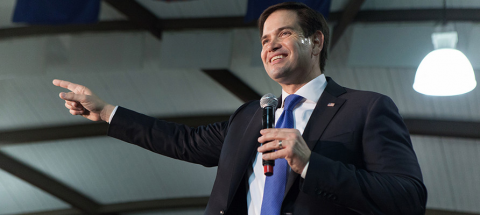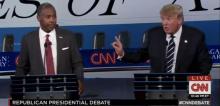
To hear Marco Rubio tell it, voters in this year’s Republican presidential primaries and caucuses are just too angry to support a cheerful candidate like himself. At least that’s how Rubio explained it to his supporters the night of March 15 when he announced that he was suspending his campaign for president.
Rubio’s speech came a few minutes after Donald Trump was declared the winner of Florida’s GOP primary. That defeat in his home state was the last straw for Rubio, but he was unbowed, telling supporters, “And so, while this may not have been the year for a hopeful and optimistic message about our future, I still remain hopeful and optimistic about America.” Rubio saved some of the blame for the media and the conservative movement, too, for helping to bring about the rise of Donald Trump. The one thing Rubio did not do was point the finger at his own record on important issues that ultimately led to his exit from the 2016 presidential campaign.
Marco Rubio rode the Tea Party wave of 2010 to a victory in Florida’s U.S. Senate race. He promised voters, among other things, that he would oppose amnesty for illegal aliens. But not long after arriving in Washington, Rubio made common cause with liberal Democrats and establishment Republicans in the so-called Gang of Eight. He eagerly did the bidding of gang leader and Democratic Senator Chuck Schumer, who made Rubio responsible for selling “comprehensive immigration reform” – Washington code language for illegal alien amnesty – to his fellow Republicans. When things started to go badly for the gang’s amnesty bill, Rubio disavowed it. Still, his constituents did not appreciate their senator’s flip-flop. Once the damage was done, Rubio could not take it back.
If there’s one thing the GOP establishment likes more than amnesty for illegal aliens, it’s government programs that flood this country with foreign workers who undercut the wages of Americans in a wide range of jobs. Rubio was right in step with the establishment on this one, too. He sponsored a bill to triple admissions under the H-1B visa program, which some U.S. employers exploit to bring in cheap foreign labor and boost corporate profits at the expense of American workers. Maybe Rubio figured that gaining favor with big Republican donors was worth the risk of angering working-class voters. If so, he made the wrong bet.
When Rubio announced his presidential candidacy last April, his establishment patrons were more than happy to open their checkbooks on his behalf. After all, Rubio had carried the water for them on amnesty and more foreign workers. He had every right to expect a generous payback. Even as some Republican establishment figures poured millions into Jeb Bush’s campaign, Rubio did not go begging. Despite Rubio’s nearly unbroken record of third and fourth place finishes in the Republican primaries, he managed to outlast Bush. But replacing Bush as the establishment’s new golden boy didn’t help Rubio escape his record.
Outsider candidates Donald Trump and Ted Cruz have consistently shared anywhere from 60% to 80% of the vote in GOP primaries and caucuses because they understand that grassroots conservative voters are tired of “moderate” and even some so-called conservative Republicans who campaign on promises of border security and curtailing immigration only to go to Washington and do the exact opposite. Rubio was right on one level. Voters this year are angry. They are angry at Republican politicians who talk one way on the campaign trail and vote another way on Capitol Hill. Once Senator Rubio comes to understand that, he might be able someday to recover from his unsuccessful 2016 presidential campaign. After all, Rubio is only 44 years old. He still has plenty of time to learn from this experience.

